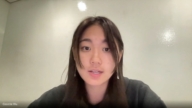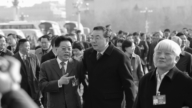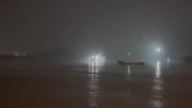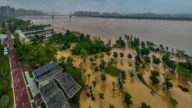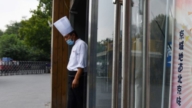【新唐人2012年3月3日訊】3月1號明鏡新聞網報導,有消息說︰中共軍委主席胡錦濤下令對中共軍隊副總參謀長章沁生停職,因爲他在軍中主張「軍隊國家化」。消息還沒有得到中共當局證實。而《法國國家廣播電臺》證實了章沁生被停職的消息,但停職的原因,是否是因爲章沁生在軍中有主張軍隊國家化的言論,目前還不得而知。不過,有學者認爲,章沁生被停職,可能和中共18大派系權鬥有關。
「哥倫比亞大學」政治學博士王軍濤認爲,如果在中共高層內提出「軍隊國家化」,主張軍隊不要服從於某一個利益派別,或個人的利益需要,這本身還不完全是西方民主制度下的軍隊和政府的關係。
王軍濤:「西方民主的關係強調軍隊不僅僅要忠於國家,而且這個國家(政權)本身應該是民選出來的,執政者應當是在憲政架構中進行運作和領導這個國家。如果違背這個,軍隊就不效忠他,而且要恢復國家的憲政次序。」
目前,「軍隊國家化」通常作為衡量「民主國家」的重要指標,在大部分國家被寫入憲法並成為信條。但在少數獨裁國家如中國、朝鮮等,「軍隊國家化」仍屬敏感議題。
旅美學者程曉農指出,中共軍隊自建軍以後,共產黨就把它定位為「只為黨服務」的軍隊,並且要求軍隊無條件的聽從黨的命令,而不管是否符合國家或老百姓的利益。
程曉農:「如果軍隊一旦不聼共產黨的(話),那麽共產黨就再也維持不住了。所以共產黨堅定的絕不放棄對軍隊的嚴密控制。而且強烈的阻止任何關於軍隊國家化的説法或者是想法。共產黨的政權歸根結底是要靠效忠於共產黨的軍隊來支撐的。」
章沁生最後一次公開露面,是在2月27號總參謀部的一個會議上。
在此之前,有傳言說,在年前軍委的團派會上,章沁生大罵軍中高官的兒子以權謀私,弄了百億身家,而轟動會場。也有傳言說,章沁生的這一行為激怒了軍中大佬。
王軍濤:「從軍隊的結構上看,(章沁生)他這種話、言論其實還很難得到實現。我覺得軍隊裏可能不止兩種聲音吧,胡核心要保持對軍隊的領導權,還是用軍隊處理政治問題。也有人猜測,因此太子黨可能也想控制軍隊,可能跟這個也有關係。太子黨對他這樣背景的人不放心,那麽可能也對他採取一些動作。」
據報導,在2005年中俄聯合軍演中,章沁生是中方參謀長。作為中共十七屆中央委員的他,被認為本有可能成為總長或防長的候選人。
不久前,中將谷俊山因為涉及貪腐落馬,現在再傳章沁生被停職的消息。王軍濤認爲,這一系列軍中的異常變動,和中共18大和18大後的權力分配格局有關。
王軍濤:「這兩個人被拿掉,會影響軍中的權力,就是18大之後的權力,派系的對比和力量的對比分配。由於現在出現權力真空,軍中各派可能競爭會比較激烈,多多少少會牽扯到18大前後的中共其他派系的權力佈局,甚至會影響最高核心的權力分配。」
網上資料顯示,章沁生生於1948年5月,山西孝義人。06年晉陞中將軍銜,07年出任廣州軍區司令員。09年12月出任總參謀部副總參謀長。
新唐人記者常春、王子琦、李若琳採訪報導。
General Zhang Qinsheng Suspended from Duty before 18th National Congress
On March 1, Mingjing News reported rumors saying that the Chairman
of the Chinese Communist Party’s (CCP) Central Military Commission
Hu Jintao gave orders to suspend Deputy Chief of Staff Zhang Qinsheng
from active duty because Zhang wished to “nationalize “the military.
The French National Radio Station has confirmed the suspension,
but whether Zhang’s suspension was due to talk of nationalizing the military is still unknown.
Some scholars believe, that Zhang’s suspension might have something
to do with the power struggle during the 18th National Congress.
PhD in Political Science at Columbia University Wang Juntao
Believes that, proposing “nationalization of the military,”
and advocating that the military shouldn’t obey
any particular faction or person,
this suggestion is by itself not quite the same as the relation
between the government and military in western democracies.
Wang Juntao: “In western democracy, the military is not only
loyal to the country, but the government is also democratically elected.
The ruling party can only operate and lead the country according to
the constitutional framework. If (the ruling party) violates this rule,
then the military will not serve the party,
and will restore the country’s constitutional order.”
Currently, “nationalization of the military” is an important metric
that can be used to define democratic countries; most countries have this written into their constitution.
However, in a few dictatorships like China, North Korea,
and others, nationalization of the military is a sensitive topic.
Visiting scholar in the U.S Cheng Xiaonong expressed the view
that, since the CCP itself had formed the military,
the military position was “only to serve the party,” and
to unconditionally follow commands of the party, neglecting national or public interests.
Cheng Xiaonong: “If the military stops listening to the CCP,
then the CCP can’t sustain itself anymore.
This is why the CCP will never give up strict control
over the military, and will oppose suggestions or thoughts regarding nationalization of the military.
The CCP’s rule was fundamentally based on a military loyal
only to the CCP itself.”
Zhang Qinsheng’s last public appearance was during a meeting
at the General Staff Headquarters on Feb 27.
Before that, it’s been rumored that during a Central Military
Commission meeting,
Zhang Qinsheng cursed at sons of senior military officials
abusing their power, corrupting billions, then stormed out of the meeting.
There are rumors that Zhang’s action has
angered senior officials in the military.
Wang Juntao: “Looking at the military frame work, his (Zhang
Qinsheng) words, any discussion is hard to imagine.
I feel that the military can’t have two different voices;
Hu Jintao wishes to keep leadership of the military, and to do a deal with political issues using the military.
Some guessed, maybe the princelings also want to control the
military, so this suspension of duty might be related to that.
The princelings are not comfortable with someone with
his background, so they might have done something.”
According to a report, during the China-Russian joint military
exercise in 2005, Zhang Qinsheng was the Chief of Staff for
the Chinese regime. As a member of the 17th central committee,
he is candidate for Chief of Staff or Defense Minister.
Not long ago, lieutenant general Gu Junshan was taken out
on corruption charges, now Zhang Qinsheng has been suspended.
Wang Juntao believes that all this has to do with future power
distribution after the 18th National Congress.
Wang Juntao: “With those two taken out,
power in the military will be affected,
that is power distribution among the various factions
after the 18th National Congress.
Since some empty spots will be created, infighting in the
military will be intense;
this will influence power distribution among different CCP
factions and will influence power distribution at the highest level.”
According to online data, Zhang Qinsheng was born in May
1948 in Shanxi Xiaoyi. He became lieutenant general in 2006,
Commander of the Guangzhou Military Region in 2007.
In December of 2009, he became Deputy Chief of Staff.
NTD Reporters Chang Chun, Wang Ziqi and Li Ruolin


